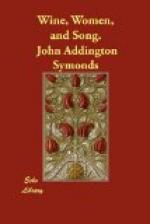Comparison with the original will show that I was not copying Byron’s When we Two Parted; yet the resemblance between that song and the tone which my translation has naturally assumed from the Latin, is certainly noticeable. That Byron could have seen the piece before he wrote his own lines in question is almost impossible, for this portion of the Carmina Burana had not, so far as I am aware, been edited before the year 1847. The coincidence of metrical form, so far as it extends, only establishes the spontaneity of emotion which, in the case of the medieval and the modern poet, found a similar rhythm for the utterance of similar feeling.
FOOTNOTES:
[Footnote 32: Page 38.]
FAREWELL TO THE FAITHLESS.
No. 40.
A mortal anguish
How often woundeth
me;
Grieving I languish,
Weighed down with
misery;
Hearing the mournful
Tale of thy fault
and fall
Blown by Fame’s scornful
Trump to the ears
of all!
Envious rumour
Late or soon will
slay thee:
Love with less humour,
Lest thy love
betray thee.
Whate’er thou dost,
do secretly,
Far from Fame’s curiosity;
Love in the dark delights
to be,
His sports are wiles and witchery,
With laugh of
lovers greeting.
Thou wert not slighted,
Stained in thine
honour, when
We were united,
Lovers unknown
to men;
But when thy passion
Grew like thy
bosom cold,
None had compassion,
Then was thy story
told.
Fame, who rejoiceth
New amours to
utter,
Now thy shame voiceth,
Wide her pinions
flutter.
The palace home of modesty
Is made a haunt for harlotry;
The virgin lily you may see
Defiled by fingers lewd and
free,
With vile embraces
meeting.
I mourn the tender
Flower of the
youth of thee,
Brighter in splendour
Than evening’s
star can be.
Pure were thy kisses,
Dove-like thy
smile;
As the snake hisses
Now is thy guile.
Lovers who pray thee
From thy door
are scattered;
Lovers who pay thee
In thy bed are
flattered.
Thou bidst them from thy presence
flee
From whom thou canst not take
thy fee;
Blind, halt, and lame thy
suitors be;
Illustrious men with subtlety
And poisonous
honey cheating.
I may add that a long soliloquy printed in Carmina Burana, pp. 119-121, should be compared with the foregoing lyric. It has a similar motive, though the lover in this case expresses his willingness for reconciliation. One part of its expostulation with the faithless woman is beautiful in its simplicity:—




